Friday News – Georgetown Executive Program Earns Top 10 Ranking, UVA Darden Launches Online Career Development Tool, and More

Let’s take a look at some of the biggest stories from this week, including the Georgetown Executive Education program earning some heady praise from the Financial Times.
Financial Times Ranks Executive Custom Programs #10 in U.S. – Georgetown McDonough School of Business News
Georgetown University’s McDonough School of Business has been recognized by the Financial Times as one of the top ten best executive education programs in the country.
On the news, Charles Skuba, Senior Associate Dean for Executive Custom Programs, says, “Our client-centered approach to executive education at Georgetown McDonough ensures every program is tailored to the specific needs of each organization … We’re proud of our ranking and the results we deliver for our loyal and growing number of clients.”
McDonough’s Executive Custom Programs are tailored to the needs of each individual and their organizations. Advisors consult with students to build a curriculum that will best meet their unique goals. Among the areas covered by custom programs are market strategy and non-market strategy, global leadership and operations; corporate responsibility, communications, project management, and finance.
You can learn more about the Georgetown Executive Education Custom programs here.
UVA Darden Launches Summer Program Offering Admitted Students Early Preparation for MBA Recruiting Success – UVA Darden School of Business News
The University of Virginia Darden School of Business has announced the launch of a new tool to assist incoming MBA students in preparing for internships and their future careers.
The program, Career Development WhyFinding, was developed by Darden’s Career Development Center. It features videos, interactive modules, and curated resources that are designed to guide students through the early stages of professional development. One of the main features of CDWhy is its ability to assist in preparation for the rigorous recruiting process.

Inside the UVA Darden Career Development Center / Photo via news.darden.virginia.edu
“Year after year, we hear from Darden students that they wish they had begun preparing for MBA recruiting in the summer before their First Year,” says Jeff McNish of the Career Development Center. “We are thrilled to now offer this service to Darden’s career-driven students so that they can gain a head-start in the competitive MBA recruiting process.”
CDWhy was developed with input from a diverse group of Darden students and alumni. The Career Development Center has planned to implement versions of CDWhy that are tailored to both Executive MBA and Business Analytics students. Learn more about the Center and about CDWhy here.
Tuck Makes Applicant-Friendly Changes for the 2019-2020 Admissions Cycle – Tuck School of Business News
With the goal of streamlining the admissions process, Dartmouth College’s Tuck School of Business has made some changes to its application process.
The application deadline for round one will be October 1, with decisions released in early December. November 1 is the cutoff for applicant-initiated interviews. Luke Anthony Peña, Executive Director of Admissions and Financial Aid, says:
“We pledge to listen and to be responsive to our applicants. Moving our round one deadline back two weeks provides several additional days for aspiring Tuck students to visit campus and interview before finalizing round one applications … And once again, we are committing to a shorter wait time for decisions.”
In the new application, there will be three 300-word essay questions, and the short answer portion has been omitted. In addition, Tuck has adopted the GMAC’s Common Letter of Recommendation questions. Both the essay and the recommendation questions can be found here.
Another Successful Showcase for the UCLA Anderson Venture Accelerator – UCLA Anderson News
At last month’s UCLA Anderson School of Management Venture Accelerator Showcase, ten companies presented their startups to an audience of venture capitalists and potential investors.
Among the presenters were a skin care company and a ready to drink cocktail, in addition to a product that uses WiFi to charge mobile devices. Created by a father and son team, this product has already received funding. Trish Halamandaris, Director of the Anderson accelerator, says of the showcase, “This year’s companies were further along in their product development, which resulted in some better funding … Much of that success can be attributed to the increased number of Anderson alumni who served as advisors and were instrumental in helping these companies accelerate their growth.”

Members of the 10 teams competing at this year’s UCLA Anderson School of Management Venture Accelerator Showcase / Photo via anderson.ucla.edu
The competitors were U-Defi, an anti-aging skin care product; Indarra, a fast-casual Indian restaurant; Bluprint, a presentation tool; Creative Propulsion Laboratory, a production company for children’s content; VoiceLife, a wireless charging product; Elenita, the ready-to-drink mescal cocktail; and Nutopia, a blockchain service for the film and television industry. You can read more on the competitors and the showcase here.
EMBA Students’ Alabama Road Trip: Reflections on Racial Injustice – Berkeley Haas News
A group of EMBA students from UC Berkeley’s Haas School of Business traveled to Selma and Montgomery, Alabama over Memorial Day to experience the history of the civil rights movement with the hope of informing their studies and their careers.
The trip held special significance for Lisa Rawlings (EMBA 19) whose grandmother was born in Alabama and moved to Memphis as a teenager. “Putting myself in my grandparents’ shoes, I realized that courage was not always resistance, but sometimes it was simply endurance, which often required unthinkable compromises to their dignity to save their lives and those of their loved ones,” she says of the visit.
Rawlings was joined by her EMBA classmates, touring the National Memorial for Peace and Justice, along with Dexter Avenue King Memorial Baptist Church, where Dr. Martin Luther King Jr. served as pastor. They also crossed the Edmund Pettus Bridge in Selma, where law enforcement and protesters for voting rights had a standoff in 1965.
You can learn more about the Berkeley Haas students’ journey to Alabama here.
Top 10 Schools that Specialize in Healthcare Management

Healthcare Management MBAs are becoming a popular track for students who want to enter a growing industry that’s ripe with innovation. According to the Bureau of Labor Statistics, medical and health care managers, also called healthcare executives or healthcare administrators, are responsible for planning, directing, and coordinating medical and health services. They manage entire medical facilities, departments at nonprofits, and medical practices for physicians.
BLS reports that employment of health care management personnel is projected to grow 20 percent from 2016 to 2026, which is much faster than the average for nearly all other industries. This is partially because the Baby Boomer working class is aging into retirement, thus increasing more demand for healthcare services. The average pay for health care management professionals is an estimated $98,350 per year ($47.29 per hour).
While some health care managers have a bachelor’s degree, master’s degrees also are common in the field. If you’re a prospective MBA hoping to enter the health care field following graduation, are you aware of all the specialized healthcare management majors, courses and programs offered at business school across the nation? Many of the country’s top business schools have put together special options for students looking to get an in-depth look at one of the largest and fastest growing sectors in the US economy. Let’s take a look at the best of the best. Continue reading…
New MBA Jobs: BCG, Merck, Adobe and More

There are hot new MBA jobs that need to get filled each and every week all over the world. Here are a few new openings for entry level and advance positions at a range of companies, and don’t forget to check out the best new MBA jobs right here on MetroMBA every week.
How Can You Get a Job at Boston Consulting Group in 2018?

Boston Consulting Company—a global management consulting firm— has offices across more than 90 cities and 50 countries, advising clients in the private, public, and not-for-profit sectors, including a healthy chunk of Fortune 500 companies. Considered one of the most prestigious management consulting firms in the world, BCG was ranked fourth in Fortune’s “100 Best Companies to Work For” in 2018.
But, how can an MBA help you land a BCG job?
Working for BCG
According to Management Consulted, BCG has a demanding recruiting and hiring system. The firm hires undergrads as associates who work for two to three years before moving on or pursuing an MBA. However, it is very difficult and highly unlikely for an associate to make the leap to consultant without an MBA. If you’re hired as an MBA, you enter as a consultant with plenty of room for growth—to project team leader, principal, and then, finally, as a partner partner.
According to former BCG senior partner Lucy Brady, the company looks for a candidate’s record of academic and professional success, but also want to hire candidates who have overcome setbacks.
“We look for resiliency and adaptability, and the ability to learn from your mistakes and grow from them,” she said in a previous interview.
CNN revealed that 11.72 percent of MBAs want to work for BCG. However, BCG’s recruiting process is demanding, with Glassdoor previously ranking the firm among the most difficult companies to interview with.
The high job demand and lengthy interview process isn’t without reason: MBAs typically thrive at BCG due to the companies the emphasis on career development. BCG’s PTO (predictability, teaming, and open communication) policies allow for a healthy work-life balance for employees, which has paid numerous dividends. Internal surveys have shown that the program has led to a 74 percent increase in reported intentions to stay with the company for the long term. BCG was also among the companies that signed the 2016 White House Equal Pay Pledge.
BCG Recruiting on Campus
BCG actively recruits students on college and university campuses around the world. Campus visits are a way for students to connect with BCG, learn more about potential job opportunities, and feel out whether a career at BCG is a good fit.
“We have a presence at many of the top universities across the U.S., including Harvard, Stanford, the University of Pennsylvania, Northwestern, University of Michigan, Duke, and the University of Texas,” Tina Gao, BCG recruiting director, said in a previous interview. “We come to campus and hold a presentation to introduce the company and then are available for Q&A sessions. We also come back to help people train for our interviews and learn more about the company. We’ll come back to campus to interview the candidates we choose.”
You can see more upcoming BCG on campus events here. However, if your campus does not have a dedicated page, BCG encourage students to complete an online application for consulting internships.
BCG Internships
BCG’s consulting internship programs can be a great opportunity for students to get a feel for the the life of a consultant. BCG Associate and Consultant interns work with current BCG consultants, and are expected to contribute to a real client project. Interns are considered as true case team members and are tasked with everything from working on client projects to socializing with colleagues.
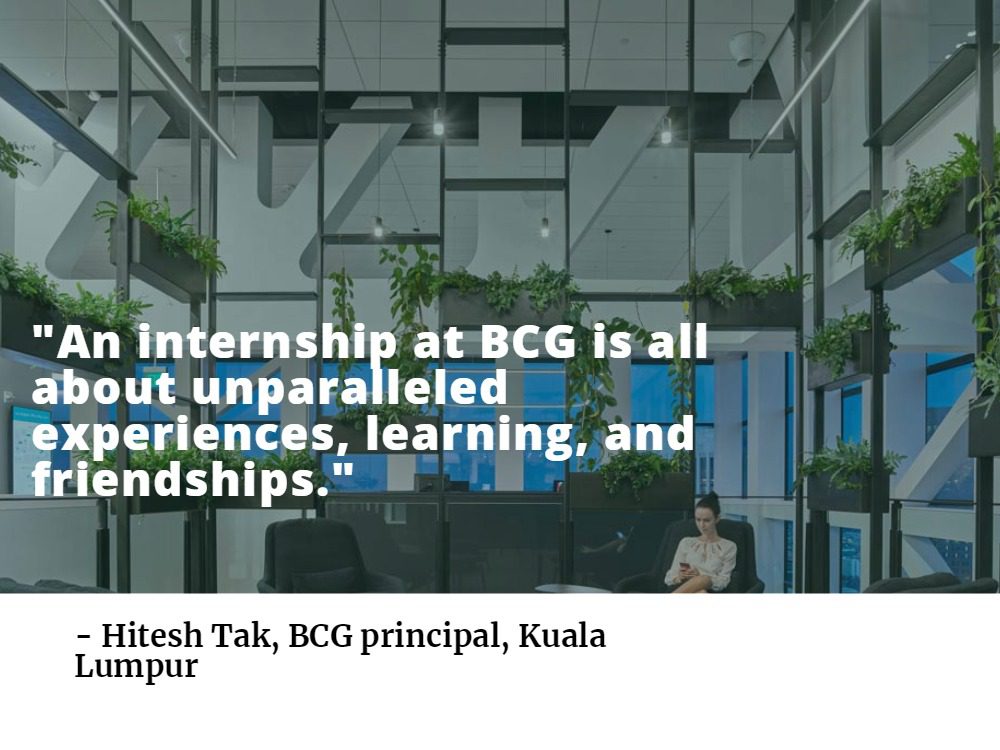
According to BCG, internships vary depending on the project or location. Some interns are expected to travel, but do return to their home offices at the end of each week for special events and social activities. Orientation and training sessions ease interns int their roles before being assigned to a case that aligns with their personal and professional goals, as well as the firm’s business needs.
BCG accepts online applications from exceptional business school, engineering, science, law, and humanities students who are nearing the completion of their undergraduate or graduate studies.
BCG MBA Fellows
If you’re an MBA who wants to get your foot in the door at BCG, it’s worth looking into the BCG Fellows MBA Program, which provides top applicants with monetary awards and individual mentorship by BCG consultants.
The fellow program is only available to full-time MBAs studying at the following business programs: Columbia Business School, Fuqua School of Business, Kellogg School of Management, Harvard Business School, MIT Sloan School of Management, Stanford Graduate School of Business, Stern School of Business, Tuck School of Business, Anderson School of Management, Booth School of Business, Ross School of Business, Darden School of Business, The Wharton School and Yale School of Management.
BCG MBA Salaries
If you score a job at BCG, you’ll also be earning a big paycheck—well worth the hours of MBA studies and the rigorous recruiting process. According to Management Consulted, MBAs hired a BCG make earn the following within their first year of employment:
- Signing Bonus: Up to $30,000
- Base: $147,000
- Relocation: $2,000-8,000
- Performance Bonus: up to $44,100
- Retirement: Profit-sharing into a 401k
Harvard Business School Tops Bloomberg Businessweek Ranking

For the third straight year, Harvard Business School reigned supreme in the annual Bloomberg Businessweek “Best Business Schools” ranking, topping the Wharton School at the University of Pennsylvania and MIT Sloan School of Management. In joining HBS on the medals podium this year, those schools both saw significant gains over last year, climbing from sixth and seventh respectively.
Rounding out the top five this year is the University of Chicago Booth School of Business —holding steady year over year at fourth—and Stanford Graduate School of Business, which fell from second place in 2016 to fifth this year.
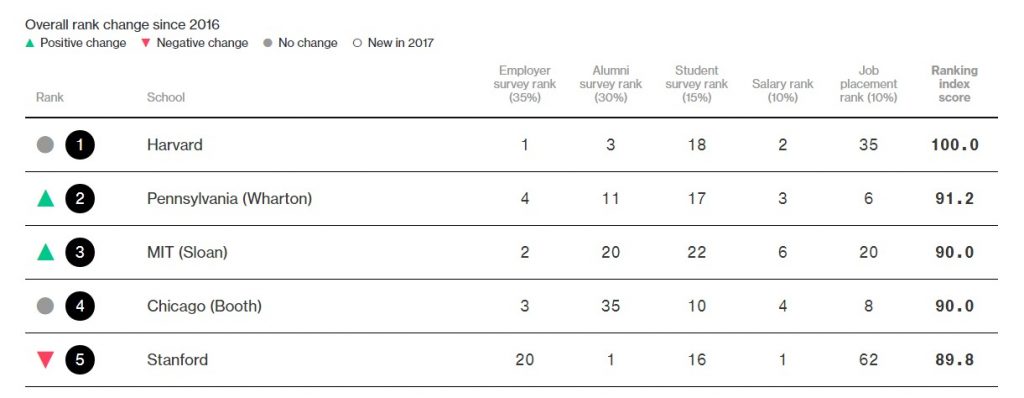
The methodology Bloomberg Businessweek uses to arrive at its annual MBA ranking involves weighting each of five principle factors. Employer surveys account for 35 percent of a school’s score. Alumni surveys account for another 30 percent. And a combination of current student surveys, salary rankings, and job placement together account for the remaining 35 percent of the final score.
High Risers
Ten out of the top 20 ranked schools in the 2017 Bloomberg Businessweek ranking advanced at least one spot over last year. Wharton and Sloan each managed to leap four spots, boosted by high praise from employers and hefty salary benefits for recent graduates. The University of Washington Foster School of Business also managed to jump from 19th to 15th overall this year, thanks largely to its top ranking as the nation’s best business school for job placement.
The Cornell S.C. Johnson Graduate School of Management and the UCLA Anderson School of Management both saw a rankings jump of three spots, with Johnson moving up to 13th and Anderson coming in at 19th.
The year’s biggest winner, however, may be the Penn State Smeal College of Business, which jumped a whopping 12 spots from last year’s 37th to come in at 25th in 2017. It wins the award for the year’s biggest overall rankings increase. The USC Marshall School of Business also saw a momentous climb this year, sidling up eight spots from 38th last year to 30th this year.
In the latter half of the rankings came another one of this year’s biggest risers, with the Terry College of Business at the University of Georgia jumping 11 spots from last year, up from 65th overall to 54th. Elsewhere, the David Eccles School of Business at the University of Utah, the Whitman School of Management at Syracuse University, the C.T. Bauer College of Business at the University of Houston, and the Pepperdine University Graziadio School of Business and Management all saw a jump of at least seven spots in the new ranking.
Once Mighty, Now Fallen
Stanford GSB, Duke’s Fuqua School of Business, Dartmouth’s Tuck School of Business, and Jones School of Business at Rice University may all be feeling a wee bit dizzy. Last year Stanford shot up to second from seventh the year before, but this year it finds itself demoted to fifth. Duke’s Fuqua School, which last year celebrated a momentous jump from eighth to third, this year fell back down to seventh. Dartmouth’s Tuck School of Business, which had one of last year’s biggest gains, rocketing up nine spots to break into the top five from a mere 14th place finish the year before, this year finds itself at seventh. Similarly, Rice Business, as the Jones School likes to be called, which last year catapulted 11 spots to number eight, this year slipped to tenth. But at least all maintained their footing within the top 10.
Emory’s Goizueta Business School and the Texas A&M Mays Business School, for their part, slipped out of the top 20 altogether. Goizueta slipped just slightly, from 20th to 21st, and Mays slid from 18th to 22nd. The University of Virginia Darden School of Business also stumbled, slipping from 12th last year to 17th this year. But the Charlottesville school at least managed to remain in the top 20, thanks in part to strong scores in the student survey and salary categories.
No school, however, lost more ground than the George Washington University School of Business, which fell an eye-popping 14 spots from last year, losing its place among the top 50 business schools in the United States.
Bloomberg BW has made multiple changes to its methodology in recent years, resulting in significant volatility in terms of where schools fall on the list even when not much has changed year over year at the individual schools themselves. This has led many to question the credibility of the ranking overall. That said, Clear Admit’s Alex Brown found this year’s results easier to swallow than some in recent years. “This ranking seems more reasonable to me this year,” he says. “Each of the M7 programs are in the top 10, and the schools I would consider in the top 16 are all in the top 20.”
You can view the complete 2017 Bloomberg Businessweek rankings here.
This article has been edited and republished with permissions from Clear Admit.
The Top 5 Reasons Diversity MBA Conferences Should Be on Your Recruiting Calendar
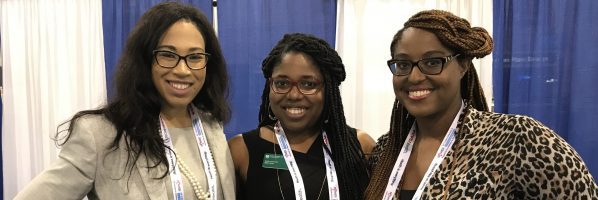
Pictured above: Tuck second-year MBA students Bianca Goins, Sadé Lawrence, and Jodine Gordon.
More than 10,000 MBA students, business school representatives, recruiters, and business executives filled the Pennsylvania Convention Center in Philadelphia late last month for one of the largest career conferences serving minority professionals. The conference has been around since 1970, but for the first time this year the National Black MBA Association (NBMBAA) and Prospanica, the association of Hispanic professionals, joined forces to present it. The result was an incredible opportunity for attendees to network with companies and each other, take advantage of career development programming, and interview for and secure job offers from hundreds of companies spanning multiple industries.
Cornell’s S.C. Johnson Graduate School of Management had a group of approximately 55 students attend, a mix of first-year and second-year students, according to Cynthia Saunders-Cheatham, Executive Director of Johnson’s Career Management Center.
“It was double what we have had in recent years, and perhaps the largest attendance we ever had for an MBA diversity conference,” she said. “Having a joint NBMBAA/Prospanica conference, in addition to the Philadelphia location that was driving distance away [from Ithaca, NY, where Johnson is located], helped to drive attendance.” The connections that students made while there have already resulted in multiple job offers, she added.
While securing a job or internship is a primary reason many MBA students choose to attend the National Black/Prospanica conference and others like it, that’s just one of many potential benefits events like this offer. Given that this most recent conference was right here in our hometown of Philadelphia, we went to check things out for ourselves. Through conversations with attendees, school representatives, and recruiters, we’ve compiled the following list of reasons why this year’s crop of applicants should be sure to add diversity MBA conferences to their recruiting calendar next summer and fall.
1. Unparalleled Recruiter Access—Including Many That Don’t Come to Campus
The Career Expo, which took place on the last two days of the five-day National Black/Prospanica conference, filled a cavernous hall in the Convention Center and included booths from close to 300 companies spanning dozens of industries. Among them were coveted post-MBA tech employers like Google and Amazon, consulting industry leaders including Bain & Company and Accenture, and financial services firms such as BlackRock, Bank of America, and Morgan Stanley. There was a continuous gaggle at the Google booth, and one of its MBA internship recruiters, Tanya Choudhury, had to resort to wearing a sign by the second day explaining that she’d lost her voice.
Big pharma and healthcare were also well represented, with booths attended by recruiting representatives from drug maker AstraZeneca to medical products and equipment company Zimmer Biomet and many in between. Leading consumer packaged goods (CPG) firms including PepsiCo, General Mills, and Proctor & Gamble were also there, as were oil and gas giants like BP, Chevron, and Exxon.
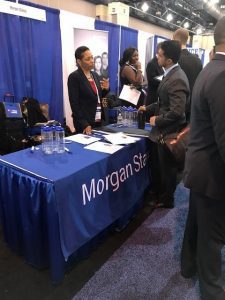
Morgan Stanley was one of almost 300 exibitors in the conference’s packed Career Expo.
But there were also plenty of organizations that are perhaps less top of mind as potential MBA recruiters—the Central Intelligence Agency, the U.S. Department of State, Teach for America, and USAID, for example—who were just as eager to share how highly they value the MBA skillset. Dozens of leading business schools also had booths, largely to provide support and serve as gathering places for students who were attending, but also with an eye out for promising diverse talent. For example, Roberto Martinez, a Senior Talent Acquisition Consultant for Dartmouth College—home to the Tuck School of Business—was eagerly distributing glossy handouts touting the school’s varied career opportunities, commitment to diverse hiring practices, and excellent benefits. “We’re here not only to support students but also to hire more diverse staff to campus,” he said.
For Tuck second-year MBA student Bianca Goins, the breadth of companies at the expo was a big part of the draw. “I wanted a diverse group of companies to look at in a single spot,” she said. “There are so many companies here, and as second-year you can really come and pick and choose the experiences you want to have.”
Tiffany Anderson, a second-year student at Emory’s Goizueta Business School, was also impressed by the sheer number of companies present. A self-proclaimed conference veteran, she also attended National Black last year, as well as conferences presented by the Forté Foundation, the Consortium for Graduate Study in Management, Management Leadership for Tomorrow, and JumpStart. “Out of all the diversity conferences, I would certainly say this is the flagship,” she said. “Wow! There are A LOT of companies here,” she recalled thinking to herself as she walked in. More so than last year, before National Black and Prospanica teamed up, she added.
“I have seen the most people—students from many different schools and recruiters from many different functional areas of interest,” she continued. “It seems to be the most diverse in terms of attendees, degree of programming, and companies in attendance. For the majority of people, this is going to be one of the best to attend.” Anderson estimates that there were probably 30 or so Goizueta students there, a mix of first- and second-years.
2. Multiple Touch Points and Opportunities for Face Time
For some students, certainly, the primary purpose in attending the conference is to land a job. Second-year IU Kelley School of Business MBA student Henrique Barbosa, a native of Brazil pursuing travel hospitality, had a simple answer when asked why he was there: “To get a job!” He acknowledged that most of the firms he was interested in only conduct first-round interviews at the conference followed by second-round interviews on site, which lessened the likelihood of his leaving with an offer in hand. “But it would be great if it happened,” he said.
But several other students were less interested in job or internship offers—or even in early round interviews. For Jodine Gordon (Tuck ’18), the biggest factor in her decision to attend was hearing success stories from Tuck grads whose higher-level touch points with conference recruiters later helped them secure offers. “I have a couple companies on my list, but really I just want to meet as many people as possible so they can get to know me and I can get face time,” she said.
Sadé Lawrence, also a second-year student at Tuck, was likewise attracted by the opportunity to get in front of recruiters in person. “For a lot of opportunities you might be interested in, you start online at a website, applying through data base,” she said. “But coming here they now have a face with your name, and there are all kinds of organic connections that can happen,” she added. “It’s kind of amazing that you are able to build connections with people even at such a big conference, but you are. You make contacts and get lots of face time—so much more so than you can blindly through a website,” she continued. “What I have heard more of is people have an interaction with a recruiter here that leads to an interview later—here is more about entering the pipeline.”
Tuck’s Goins has taken the opportunity to network with recruiters who don’t make it to Tuck’s campus, but also those who do. “With every interaction, you are getting a more nuanced understanding of the company and can take that information and use it in subsequent interactions.”
3. Valuable Chances to Network with Peers
Goizueta’s Anderson interned in operations at Google over the summer—an opportunity she got through another diversity conference—and has been offered a full-time position on the tech giant’s Mountain View campus after she graduates. Despite having that full-time offer in hand, attending the conference still made lots of sense.
Kelley School second-year student Luis Vilchez Kupres, a native of Peru, also converted his summer internship—in supply chain operations at Cummins—into a full-time offer. So his reasons for attending the conference were not to get a job. ”I am here to support fellow Kelley first- and second-years and network a little more,” he said. He also gets to reconvene with students from other schools he met at last year’s Prospanica conference. “Often, you connect with somebody and they will help you connect with someone else,” he said. “Networking definitely helps—even among other MBA students.”
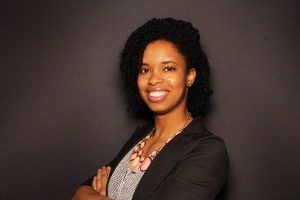
Tiffany Anderson, Goizueta MBA ’18, a diversity MBA conference veteran
For the Google-bound Anderson, the value of peer networking can’t be stressed enough. Being able to connect with students from other schools is the part she finds most enjoyable—but it’s also strategic. “When candidates are selecting a school they like to look at the size of the network they are going to get—and that’s great,” she said. “But the way I see it, I don’t have to be at Stanford or Wharton because I have friends at Stanford and Wharton. So in a way that’s kind of my network, too.”
“You have that domino effect,” she continued. If she’s trying to connect with someone at a company where she doesn’t have a contact or her classmates don’t have contacts, she can reach out to a friend at another school to see if there’s someone in their network. “Some might say, ‘Well, they’re a peer, they’re not an employer, they’re not going to get me a job.’ But there is so much more benefit to expanding your network. I don’t think everyone understands that.”
Of course, peer networking can be a two-way street. “My motivation to expand my network comes from wanting to help others as well,” Anderson said. “When you are part of these diversity networks, one of the great things is you are going to have a friend who says, ‘Do you know someone who can help me with this?’ And I can say, ‘Well, I met someone at a conference who does that very thing and I’m happy to put y’all in touch.’”
